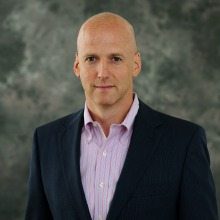
Gary Shiffman is the President and CEO of Giant Oak, LLC. The executive has spent his career in the national security community, working at firms like The Chertoff Group, where he was Managing Director, and at L-3, where he was Senior Vice President managing organizational design for the L-3 and Titan service business.
Shiffman served as the first Chief of Staff for the U.S. Customs and Border Protection at the U.S. Department of Homeland Security (DHS). He worked on Capitol Hill for four years as a national security adviser, and prior to that, after serving in the Navy during the Gulf War, he was transferred to the Pentagon where he worked on Navy budgets and defense policies.
He earned a PhD. in Economics from George Mason University, an M.A. in Security Studies from Georgetown University, where he now teaches, and a B.A. in Psychology from the University of Colorado.
Shiffman spoke to WashingtonExec about what made him want to start his own business, its play in the federal market space, current issues facing U.S. border enforcement, and how he thinks businesses and government agencies could be more resilient to computer viruses.
WashingtonExec: You are a combat veteran with a PhD, recently at the Chertoff Group, Georgetown University, and before that L-3 and Chief of Staff at CBP. Why take the jump in forming your own data analytics company? Why now?
Gary Shiffman: I saw a data revolution taking place and I needed to take an active part in shaping the future. Data grows at an incredibly fast rate; it has been estimated that the world’s data storage has doubled in the past two years. Technological developments have provided for the proliferation of storage and “cloud” infrastructures. However, the market has yet to meet the massive demand for analytics; we have data but do not have the tools to make sense of the data.
I launched Giant Oak in order to contribute innovation in data analytics, and in particular, to apply behavioral and social sciences to build inferential tools. Consistent with my past, I remain focused on national and homeland security. The Giant Oak team focuses on terrorists, insurgents, criminal, and their support networks. We seek to do our part to make the world a safer and more secure place.
WashingtonExec: What unique contribution do you hope Giant Oak will bring to the marketplace?
Gary Shiffman: I am a social scientist—a member of a profession with tools for inferential analytics. Our team’s passion is to find things in the data not directly measured. For example, we look for money laundering among people staying below BSA thresholds; we look for market indications of terrorist activities. In short, we look for non-obvious correlations. And prediction is simply impossible without theory; if you want to predict human actions you need theories of human actions. Giant Oak emphasizes the scientific method, repeatability, and the importance of theory.
_____________________________________________________________________________________________
“Our success comes from building tools to find patterns of human behavior within large data sets of human-generated behaviors. It is that simple.”
_____________________________________________________________________________________________
WashingtonExec: How does Giant Oak find things in data that are not directly captured in the data set?
Gary Shiffman: We have tools to describe human behavior and social network behavior. We work with domain experts who contribute a great deal about domain-specific behavior. “Big Data” sets represent human behavior; most data is created by human activities and interaction. Our success comes from building tools to find patterns of human behavior within large data sets of human-generated behaviors. It is that simple.
WashingtonExec: What is something that you did not expect when founding your own company?
Gary Shiffman: Sequestration and the CR. The impact of sequestration and the continuing resolution pose significant threats to small businesses in general. For Giant Oak, and other small companies, bringing innovation and potentially disruptive technologies to the market, we often need new contracts or task orders. When the government is under a CR, then “new starts” become impossible. Unfortunately, this disincentives risk taking and stifles innovation.
At L-3, our team grew the business unit well over 100 percent in about three years, but I started with about $30M in funded backlog when I took it over. Giant Oak is a start-up with all the challenges that I otherwise expected. The CR is an added “bonus.”
WashingtonExec: Why is it important for you to continue to teach at Georgetown University in the area of organized crime, insurgency, and terrorism?
Gary Shiffman: Teaching “sharpens the saw.” Having people regularly challenging your assumptions is healthy. It is like weight resistance in the gym keeping muscles strong. One night per week during the semester since 2002, I have had to stand and deliver for about eighteen of the smartest graduate students in the world. And they demand that I know what I’m talking about. That one night on campus makes me so much sharper the rest of the week.
______________________________________________________________________________________________
“I am a social scientist—a member of a profession with tools for inferential analytics. Our team’s passion is to find things in the data not directly measured. For example, we look for money laundering among people staying below BSA thresholds; we look for market indications of terrorist activities. In short, we look for non-obvious correlations.”
______________________________________________________________________________________________
WashingtonExec: What do you think of the way the United States addresses homeland security information?
Gary Shiffman: At the end of the day we really don’t share information well, but I have no doubt that we will manage data better in the near future, and therefore, manage to share and exploit information much better. Part of the reason we fail today is bureaucratic. Some of it is legal and regulatory. Laws and bureaucracies change slowly, but technology moves quickly. As we create better cloud technologies, picture tagging data at the data element level and then setting access rules at the element level. We will never share all data across the homeland enterprise—we will, however, get significantly better in the very near future.
WashingtonExec: What do you think the biggest issue facing the U.S. border enforcement process is right now?
Gary Shiffman: Awareness. We have to significantly increase our visibility of the border before we can understand the state of border security, and we must define border security before we can measure it. And we must also be able to have good metrics before we can allocate resources to improve border security. The data revolution gives us significantly more observations of behaviors on or related to the border. Now we need the advanced analytics—we need to cross-correlate data across the interagency and open source data, and we need inferential analytics to measure things not directly observable. We are on the cusp of having these capabilities, and then life will get significantly more difficult for criminals, smugglers, and would-be terrorists.
______________________________________________________________________________________________
“Human smugglers, drug traffickers and money launderers behave in largely predicable ways. Once we appreciate the rich data sources available, we can build models of normal and illicit behaviors.”
______________________________________________________________________________________________
WashingtonExec: What are some data management changes that can help border officers and agents do their jobs more efficiently?
Gary Shiffman: Human smugglers, drug traffickers and money launderers behave in largely predicable ways. Once we appreciate the rich data sources available, we can build models of normal and illicit behaviors. Then we get the machine to do at scale what the human can only do in small batches. For example, the new 2012-2016 Border Patrol Strategic Plan moves us in that direction. It sets the doctrine: measure outcomes, not just resource expenditures.
WashingtonExec: Do you think the intelligence and security agencies manage their big data differently from each other? What effect does this have on their work?
Gary Shiffman: In the government, without the profit motive, agencies react more slowly to change. I think going forward that is not a defensible. Big data is making it possible to exploit information that wasn’t possible in the past. All federal agencies, whether law enforcement, intelligence or otherwise, will end up using data in ways that they do not today. I’m already seeing government leaders looking to the private sector for best practices; the transformation is underway.
WashingtonExec: How do you think businesses or government agencies could be more resilient to computer viruses such as the recent DNS Changer or Stuxnet?
Gary Shiffman: Resilience comes from incentivizing the many individuals participating on your network to make smart choices. You can have the smartest Chief Security Officer, CIO, and CTO in the world, but they will not be able to overcome lax behaviors across massive networks of individuals. People around the world are attacking private and public networks; both sectors need to come to terms with this and align incentives appropriately. I actually have an article on Cybersecurity in the February 2013 International Journal of the Commons on the subject.
WashingtonExec: What advice would you give yourself if you could go back to the beginning of your career, knowing what you do now?
Gary Shiffman: Take more risks; be wrong more often. Follow your passion and work on issues and topics that excite you. I use my knowledge in big data to make the world hard for people to do bad things, and I feel good about that. I think that’s the key to a successful career.
WashingtonExec: What is your favorite restaurant to do business in?
Gary Shiffman: I can be found at Metro 29 diner on Lee Highway in Arlington quite often having breakfast and the world’s best cup of coffee.


